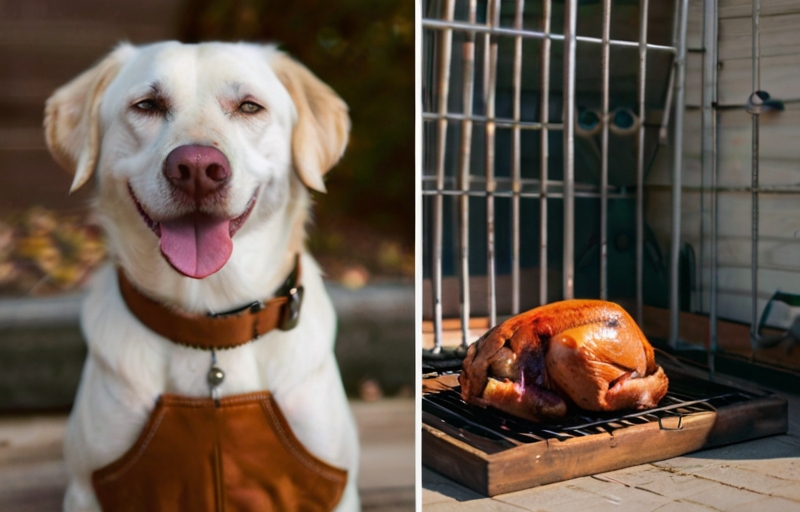Discover Can Dogs Have Smoked Turkey? The ins and outs of offering smoked turkey to your canine companion. Learn about the advantages, serving sizes, and precautions to ensure a tasty and safe treat for your furry friend.
Introduction
Dogs are known for their love of food, and as pet owners, it’s natural to want to share our meals with them. One popular human food that often finds its way to the canine plate is smoked turkey. However, before you toss a piece to your furry friend, it’s crucial to understand the potential benefits and risks associated with this indulgence.
Can Dogs Have Smoked Turkey?
Yes, dogs can have smoked turkey in moderation. Turkey is a lean protein source, and when smoked, it adds a savory flavor that many dogs find irresistible. However, there are important considerations to keep in mind.
Ingredients In Smoked Turkey

The ingredients of smoked turkey can vary based on the method of preparation and any added seasonings or flavorings. Typically, the basic ingredients for traditional smoked turkey include:
- Turkey: The primary ingredient is, of course, the turkey itself. This can include various parts such as the whole bird, breast, thighs, or drumsticks.
- Salt: Salt is often used in the brining or curing process. It helps to enhance flavor, preserve the meat, and contribute to the overall texture.
- Sugar: Some recipes may include sugar, which can balance the saltiness and add a touch of sweetness to the smoked turkey. Common types of sugar used include brown sugar or maple syrup.
- Spices and Herbs: Depending on the recipe, various spices and herbs may be added for flavor. Common choices include black pepper, garlic powder, onion powder, thyme, rosemary, and paprika.
- Liquid Smoke (Optional): In commercial or home smoking processes, liquid smoke may be used to impart a smoky flavor. This is a concentrated liquid that captures the essence of smoke without the need for traditional smoking methods.
- Brine Ingredients (Optional): Some recipes call for a brining step before smoking, which involves soaking the turkey in a solution of water, salt, sugar, and additional aromatics to enhance moisture and flavor.
Advantages of Offering Smoked Turkey to Dogs:

1. Protein Boost:
Turkey is rich in protein, which is essential for dogs’ muscle development and overall health.
2. Lean Option:
Smoked turkey, particularly without added spices or excessive seasoning, can be a leaner alternative to processed dog treats.
3. Nutrient Content:
Turkey contains essential nutrients like selenium, zinc, and B vitamins that contribute to a dog’s well-being.
4. Variety in Diet:
Introducing different proteins can provide dietary variety, preventing boredom and potential food allergies.
5. Joint Health:
Turkey contains glucosamine, which supports joint health. This can be especially beneficial for older dogs or those prone to joint issues.
6. Improved Skin and Coat:

The protein and omega-3 fatty acids in turkey contribute to a healthier coat and skin, reducing itching and promoting shiny fur.
7. Dental Health:
Chewing on small, soft pieces of smoked turkey can help in cleaning your dog’s teeth and gums, promoting better oral hygiene.
8. Weight Management:
As a lean protein source, smoked turkey can be a suitable treat for dogs on a weight management plan, providing a satisfying snack without excess calories.
9. Mental Stimulation:
Offering smoked turkey as an occasional treat can be an excellent way to engage your dog mentally, providing a change in texture and taste.
10. Bonding and Training:
Using smoked turkey as a training treat can strengthen the bond between you and your dog. The delicious reward can motivate them during training sessions.
How Much to Offer:
While smoked turkey can be a tasty addition to your dog’s diet, moderation is key. Small, boneless, skinless pieces are ideal. Treat it as an occasional indulgence rather than a regular meal replacement. Consider your dog’s size, weight, and any pre-existing health conditions when deciding on portion sizes.
Things to Consider Before Offering:

- No Bones: Ensure that the smoked turkey is boneless. Poultry bones can splinter and pose a choking hazard or cause internal injuries.
- No Seasonings: Avoid smoked turkey with added spices, herbs, or excessive salt, as these can be harmful to dogs.
- Watch for Allergies: Before offering smoked turkey, observe your dog for any signs of allergies or sensitivities.
- Moderation is Key: Excessive consumption can lead to digestive upset or contribute to obesity. Keep treats to a minimum.
Final Thoughts
Remember, while there are advantages to sharing smoked turkey with your dog, it’s crucial to balance treats with their overall diet and lifestyle, and to be mindful of individual health considerations. Always consult with your veterinarian for personalized advice based on your dog’s specific needs.
Read Also: Can Dogs Eat Turkey?
FAQs:
Can dogs eat any part of smoked turkey?
It’s safest to stick to boneless, skinless turkey pieces to avoid choking hazards and potential digestive issues.
Are there any health risks associated with smoked turkey for dogs?
While smoked turkey can be a healthy treat, be cautious about added seasonings, excessive salt, and the potential for allergies.
How often can I give my dog smoked turkey?
As an occasional treat, not a regular meal replacement. Factor in your dog’s size, weight, and health status when determining portion sizes.
Can puppies have smoked turkey?
Introduce new foods gradually to puppies and monitor for any adverse reactions. Consult your vet for personalized advice.

1 thought on “Can Dogs Have Smoked Turkey? A Comprehensive Guide”